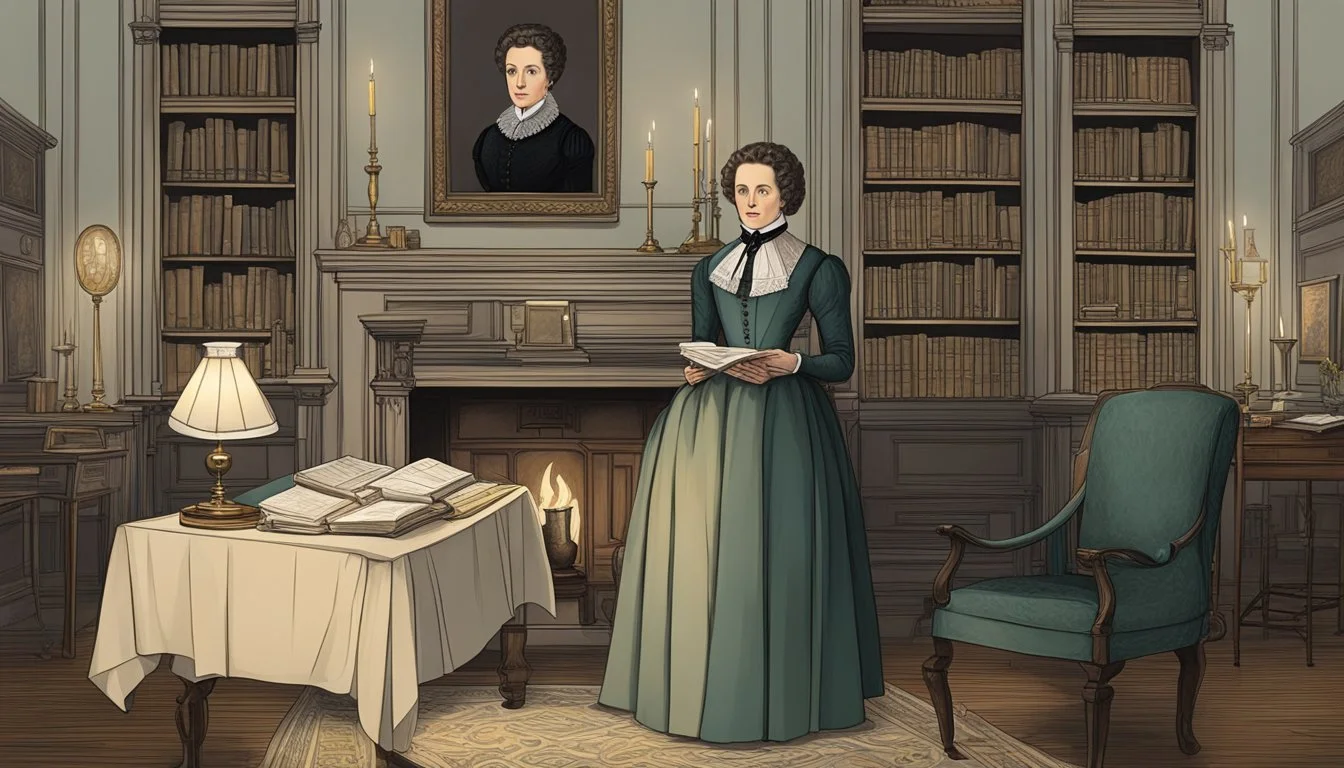Gentleman Jack: The Secret Diaries of History's 'First Modern Lesbian'
Unveiling Anne Lister's Hidden Life
Anne Lister, a 19th-century English landowner, left behind a remarkable legacy in the form of her secret diaries. These extensive journals, partially written in code, provide intimate details of Lister's romantic relationships with women, earning her the title of "the first modern lesbian." Her life and writings have recently gained renewed attention through the popular TV series "Gentleman Jack."
Born in 1791, Lister defied the social norms of her time. She managed her family's estate, Shibden Hall, in West Yorkshire, and pursued her romantic interests with unapologetic determination. Her diaries, spanning over 4 million words, offer a candid glimpse into her thoughts, desires, and experiences as a woman who loved women in Regency-era England.
The coded portions of Lister's diaries, deciphered long after her death, reveal her passionate affairs and her understanding of her own sexuality. Her writings demonstrate a self-assured approach to her identity, free from guilt or self-hatred. This unique historical record provides invaluable insights into LGBTQ+ life in the early 19th century and continues to inspire those challenging societal norms today.
Anne Lister's Life and Legacy
Anne Lister led a remarkable life as a landowner, diarist, and openly lesbian woman in 19th century England. Her experiences and writings provide unique insights into Regency-era society and LGBTQ+ history.
Early Years in Halifax
Anne Lister was born on April 3, 1791, in Halifax, West Yorkshire. She grew up at Shibden Hall, her family's estate. From a young age, Lister displayed a keen intellect and unconventional interests for women of her time.
She received an unusually thorough education for a girl in the early 1800s. Lister developed a passion for classical studies, mathematics, and sciences. Her academic pursuits laid the foundation for her future success as a businesswoman and landowner.
During her teenage years, Lister began exploring her attraction to women. She had several romantic relationships with female classmates at boarding school.
The Making of a Regency Landowner
In 1826, Anne Lister inherited Shibden Hall from her uncle. She took charge of managing the estate, demonstrating exceptional business acumen.
Lister modernized agricultural practices on her land. She also ventured into coal mining, recognizing its economic potential. Her shrewd investments significantly increased the estate's value and her personal wealth.
As a female landowner, Lister defied gender norms of the Regency era. She negotiated business deals directly and refused to be intimidated by male competitors. Her confidence and assertiveness earned her the nickname "Gentleman Jack" among locals.
Anne Lister as Gentleman Jack
Lister's appearance and demeanor challenged 19th-century expectations of femininity. She consistently wore black, masculine-style clothing. Her confident stride and direct manner of speaking were considered unfeminine by her contemporaries.
Despite societal pressures, Lister lived openly as a lesbian. She had several long-term relationships with women, including Anne Walker, whom she considered her wife. They even took communion together in 1834, which Lister regarded as a form of marriage.
Lister documented her life in extensive, coded diaries. These writings offer invaluable insights into LGBTQ+ experiences in the 1800s. Her journals also provide a detailed record of daily life, business dealings, and social attitudes in Regency England.
The Secret Diaries Unveiled
Anne Lister's journals provide an unprecedented glimpse into the life of a 19th-century lesbian. Written in a secret code, these diaries reveal intimate details of her relationships and thoughts, challenging societal norms of her time.
Deciphering the Code
Anne Lister's diaries were written in a complex code of her own devising. This crypthand combined Greek letters, algebraic symbols, and punctuation marks. The code protected Lister's privacy, allowing her to document her romantic encounters and personal reflections freely.
In the 1890s, John Lister and Arthur Burrell cracked the code. Their late-night efforts unveiled the true nature of Anne's writings. The deciphered text exposed Lister's lesbian relationships and her unapologetic approach to life.
The code's intricacy demonstrates Lister's intelligence and her determination to express herself authentically, even if only in private.
Revelation of an Unconventional Life
The decoded diaries paint a vivid picture of Anne Lister's life. They detail her numerous affairs with women, her gender non-conforming appearance, and her ambitious pursuits in business and travel.
Lister's writings reveal her confidence and self-awareness. She embraced her identity, noting in 1818, "The people generally remark, as I pass along, how much I am like a man."
The diaries also document Lister's relationships, including her "marriage" to Ann Walker. This union, though not legally recognized, was a bold statement of love and commitment in an era that denied such possibilities to same-sex couples.
Impact on LGBTQ+ History
Anne Lister's diaries have become invaluable to LGBTQ+ history. They provide rare, firsthand accounts of lesbian life in the early 19th century. Lister's frank discussions of her sexuality and relationships offer insight into a hidden aspect of history.
Her writings challenge the notion that lesbian identities only emerged in the 20th century. Lister's self-awareness and embrace of her sexuality earn her the title of "first modern lesbian" in many historical accounts.
The diaries have inspired academic studies, books, and the popular TV series "Gentleman Jack." This exposure has brought Lister's story to a wider audience, contributing to greater understanding and representation of LGBTQ+ individuals in historical narratives.
The Cultural Phenomenon
Anne Lister's secret diaries have sparked widespread fascination, inspiring literary analysis and a popular television adaptation. Her candid writings provide unique insights into 19th century lesbian life and gender nonconformity.
Literary Analysis by Historians
Helena Whitbread's groundbreaking work decoding Anne Lister's encrypted diaries in the 1980s brought her story to light. Historians like Jill Liddington and Angela Steidele have since produced detailed biographies and analyses of Lister's life and writings. Their research examines Lister's relationships, business dealings, and defiance of gender norms.
Steidele's prizewinning biography "Gentleman Jack" offers a comprehensive look at Lister's romantic and sexual encounters. It explores how Lister navigated societal expectations while living authentically. Scholars continue to study Lister's diaries for their historical and cultural significance.
Adaptation into BBC TV Drama
The BBC drama series "Gentleman Jack" brought Anne Lister's story to a wider audience. Premiering in 2019, the show stars Suranne Jones as the charismatic and unconventional Lister. It depicts her romantic pursuits, business acumen, and refusal to conform to 19th century expectations for women.
The series draws directly from Lister's coded diary entries, bringing her vivid accounts to life on screen. Its portrayal of an openly lesbian woman in the 1830s resonated with modern viewers. The show's popularity has further elevated Lister as an LGBTQ+ icon and generated renewed interest in her remarkable life story.
Shibden Hall: The Estate of Anne Lister
Shibden Hall served as Anne Lister's ancestral home and the center of her business operations. The estate played a crucial role in Lister's life, providing both a sense of identity and financial stability.
Managing Coal Seams for Financial Security
Anne Lister took an active role in managing Shibden Hall's coal seams. She studied geology and mining techniques to maximize profits from the estate's natural resources. Lister negotiated leases with local miners and oversaw the extraction process.
Her detailed diaries record her business dealings and income from coal mining. This hands-on approach to estate management was unusual for women of her time. Lister's efforts significantly increased the estate's revenue and secured her financial independence.
Historical Significance of the Estate
Shibden Hall holds immense historical value as Anne Lister's residence. The Tudor-era manor house dates back to 1420 and reflects centuries of architectural changes. Lister made several improvements to the estate during her lifetime.
She redesigned the grounds, adding a gothic tower and terraced gardens. The hall houses many of Lister's personal belongings, including her writing desk and travel souvenirs. Today, Shibden Hall is open to the public as a museum.
Visitors can explore rooms where Lister lived and worked, gaining insight into her daily life. The estate remains a tangible link to the remarkable woman known as "Gentleman Jack."
Exploring Significant Relationships
Anne Lister's diaries provide intimate glimpses into her romantic life and social interactions. Her relationships shaped her identity and challenged societal norms of the time.
Intimate Liaisons and Love Life
Anne Lister's diaries reveal a rich tapestry of romantic entanglements. She pursued numerous relationships with women, often simultaneously. Her first significant relationship was with Eliza Raine at boarding school.
Mariana Belcombe became a long-term love interest, though their affair was complicated by Mariana's marriage. Lister's most notable relationship was with Ann Walker, whom she considered her wife.
Lister's seduction techniques were carefully documented. She employed charm, intellect, and persistence to win over her love interests. Her diaries detail passionate encounters and emotional turmoil.
Public Perception and Private Life
Lister's masculine appearance and behavior earned her the nickname "Gentleman Jack" in Halifax. She faced gossip and speculation about her sexuality, but maintained a dignified public persona.
Her coded diaries allowed her to express her true self privately. Lister meticulously recorded her thoughts, desires, and experiences in a cipher of her own creation.
Despite societal constraints, Lister lived openly with Ann Walker. They considered themselves married after taking communion together at Holy Trinity Church in York in 1834.
Lister's ability to navigate between public expectations and private desires demonstrated her resilience and determination to live authentically.
Social and Political Context
Anne Lister lived during a time of significant social and political change in England. Her experiences and actions both reflected and challenged the norms of early 19th century society.
Witnessing the Peterloo Massacre
Anne Lister was present at the Peterloo Massacre in Manchester on August 16, 1819. This violent event saw cavalry charge into a crowd of peaceful protesters demanding parliamentary reform.
Lister recorded her observations of the massacre in her diary. She described the chaos and bloodshed she witnessed, providing a valuable firsthand account of this pivotal moment in British history.
The experience likely influenced Lister's political views and her understanding of class dynamics in England.
Influence on Women's Roles in Society
As a landowner and businesswoman, Anne Lister defied traditional gender roles of the Regency era. She managed her estate, Shibden Hall, with skill and determination.
Lister's extensive travels across Europe were unusual for a woman of her time. She documented her journeys in detail, offering insights into different cultures and societies.
Her diaries reveal a woman who refused to conform to societal expectations. Lister's confident pursuit of same-sex relationships challenged prevailing attitudes towards sexuality and marriage.
Through her actions and lifestyle, Lister inadvertently became a pioneer for women's rights and LGBTQ+ visibility, long before such concepts were widely discussed.
Global Travels and Diplomacy
Anne Lister's insatiable curiosity and thirst for knowledge led her to embark on extensive journeys across Europe and beyond. Her travels not only broadened her horizons but also allowed her to forge connections with influential figures of her time.
Adventurous Expeditions
Anne Lister's travels took her to remarkable destinations. She ascended Mount Vignemale in the Pyrenees, becoming one of the first recorded climbers to reach its summit. Her expeditions included visits to France, Switzerland, and Italy, where she immersed herself in local cultures and landscapes.
Lister's diaries meticulously documented her journeys, providing vivid accounts of the places she visited and the people she encountered. Her keen observations encompassed everything from geological formations to social customs, reflecting her diverse interests.
In 1839, Lister embarked on an ambitious journey to Russia with her partner Ann Walker. This trip showcased her adventurous spirit and desire to explore lesser-known territories of the time.
Cultivating International Relationships
Lister's travels facilitated connections with notable figures across Europe. She engaged in intellectual discussions with scholars, artists, and aristocrats, expanding her network and knowledge.
In Paris, Lister attended scientific lectures and literary salons, fostering relationships with leading thinkers of the day. Her ability to converse in multiple languages, including French and Latin, aided her in these interactions.
Lister's diaries reveal her adept social maneuvering in foreign circles. She often secured introductions to influential families, using these connections to further her education and business interests.
Her travels also afforded opportunities to study different land management practices, which she later applied to her own estate at Shibden Hall.
Legacy and Research
Anne Lister's diaries have become invaluable historical documents, offering unique insights into 19th century life and LGBTQ+ history. Their preservation and study continue to shed light on Lister's experiences and perspectives.
Preservation of the Diaries
Anne Lister's extensive journals, totaling over 4 million words, were hidden away for decades after her death in 1840. The diaries were eventually discovered and donated to the Calderdale Archives in Halifax, West Yorkshire.
In the 1980s, Helena Whitbread began the painstaking process of decoding Lister's secret crypt hand. This work led to the publication of edited selections in 1988 and 1992, bringing Lister's private life to public attention for the first time.
The diaries were added to the UNESCO Memory of the World Register in 2011, recognizing their global significance.
Current and Future Studies
Scholars continue to examine Lister's writings, uncovering new aspects of her life and times. Jill Liddington's research has focused on Lister's business acumen and social networks.
Angela Steidele's 2018 biography provided a comprehensive look at Lister's life, drawing on the decoded diaries and other primary sources.
Digital humanities projects are now making Lister's writings more accessible to researchers and the public. These efforts include transcription initiatives and the creation of searchable databases.
Future studies may explore Lister's scientific interests, her travels, and her place in the broader context of 19th century women's history.






